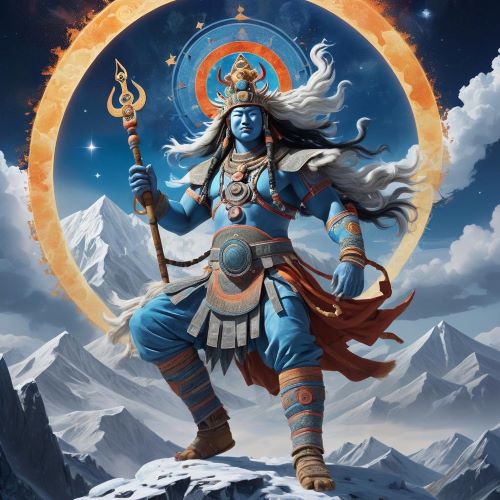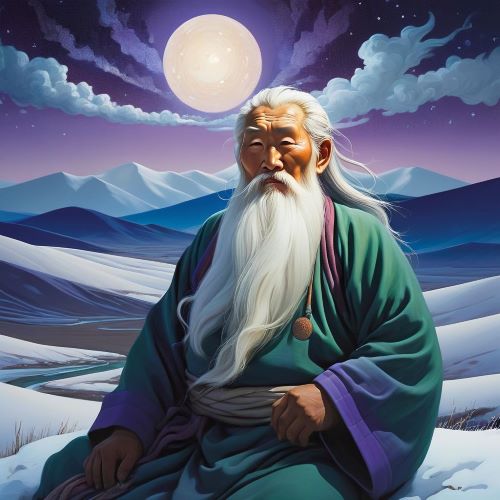Mongolian Gods
Mongolian gods hold a pivotal place in the mythology and spiritual practices of the Mongolian people, reflecting the deep connection between the divine, the natural world, and human existence. These deities are powerful and complex figures, often associated with the vast landscapes of the Mongolian steppes, mountains, and sky. The reverence for these gods is intertwined with Mongolian shamanism and ancient beliefs, where the elements and natural forces are personified in the form of gods who watch over and influence human life. Their stories and characteristics offer insights into the spiritual worldview of the Mongolian people and their relationship with nature and the cosmos.
Central to the concept of Mongolian gods is the idea of balance between the forces of nature and the divine. Gods in Mongolian mythology are often linked to specific natural elements such as the sky, wind, earth, and fire. These deities are not distant beings but are intimately involved in the daily lives of mortals, guiding, protecting, or punishing them based on their actions. The gods hold immense power over the natural world, and their favor is sought through rituals, offerings, and prayers to ensure harmony and prosperity in both personal and communal life. This dynamic between the gods and humans is a recurring theme in Mongolian mythology, highlighting the deep respect for nature that pervades Mongolian culture.
Mongolian gods are frequently depicted as warriors and protectors, reflecting the nomadic and warrior spirit of the Mongolian people. Many of these deities are associated with strength, courage, and leadership, qualities that were essential for survival in the harsh, rugged landscapes of Mongolia. These gods often engage in epic battles against evil forces, demons, or rival deities, safeguarding the world from chaos and destruction. The stories of these battles serve not only to entertain but also to reinforce the values of bravery, honor, and loyalty, which are central to Mongolian society and its mythology.
In addition to their roles as protectors and warriors, Mongolian gods also embody wisdom and cosmic order. They are believed to govern the cycles of nature and time, ensuring the proper functioning of the universe. Some gods are associated with specific celestial bodies, such as the sun, moon, and stars, while others oversee the spiritual realms, guiding souls and determining the fates of mortals. This dual role of Mongolian gods as both warriors and wise rulers reflects the complexity of their characters and the multifaceted nature of Mongolian mythology.
Mongolian gods remain an important part of the cultural heritage of Mongolia, continuing to influence modern spiritual practices and cultural expressions. Their stories are passed down through generations, preserving the ancient traditions and beliefs that have shaped Mongolian identity. From traditional festivals to contemporary art and literature, the legacy of these gods continues to inspire and captivate, keeping the spirit of Mongolian mythology alive in the modern world.
Mongolian gods hold a pivotal place in the mythology and spiritual practices of the Mongolian people, reflecting the deep connection between the divine, the natural world, and human existence. These deities are powerful and complex figures, often associated with the vast landscapes of the Mongolian steppes, mountains, and sky. The reverence for these gods is intertwined with Mongolian shamanism and ancient beliefs, where the elements and natural forces are personified in the form of gods who watch over and influence human life. Their stories and characteristics offer insights into the spiritual worldview of the Mongolian people and their relationship with nature and the cosmos.
Central to the concept of Mongolian gods is the idea of balance between the forces of nature and the divine. Gods in Mongolian mythology are often linked to specific natural elements such as the sky, wind, earth, and fire. These deities are not distant beings but are intimately involved in the daily lives of mortals, guiding, protecting, or punishing them based on their actions. The gods hold immense power over the natural world, and their favor is sought through rituals, offerings, and prayers to ensure harmony and prosperity in both personal and communal life. This dynamic between the gods and humans is a recurring theme in Mongolian mythology, highlighting the deep respect for nature that pervades Mongolian culture.
Mongolian gods are frequently depicted as warriors and protectors, reflecting the nomadic and warrior spirit of the Mongolian people. Many of these deities are associated with strength, courage, and leadership, qualities that were essential for survival in the harsh, rugged landscapes of Mongolia. These gods often engage in epic battles against evil forces, demons, or rival deities, safeguarding the world from chaos and destruction. The stories of these battles serve not only to entertain but also to reinforce the values of bravery, honor, and loyalty, which are central to Mongolian society and its mythology.
In addition to their roles as protectors and warriors, Mongolian gods also embody wisdom and cosmic order. They are believed to govern the cycles of nature and time, ensuring the proper functioning of the universe. Some gods are associated with specific celestial bodies, such as the sun, moon, and stars, while others oversee the spiritual realms, guiding souls and determining the fates of mortals. This dual role of Mongolian gods as both warriors and wise rulers reflects the complexity of their characters and the multifaceted nature of Mongolian mythology.
Mongolian gods remain an important part of the cultural heritage of Mongolia, continuing to influence modern spiritual practices and cultural expressions. Their stories are passed down through generations, preserving the ancient traditions and beliefs that have shaped Mongolian identity. From traditional festivals to contemporary art and literature, the legacy of these gods continues to inspire and captivate, keeping the spirit of Mongolian mythology alive in the modern world.


